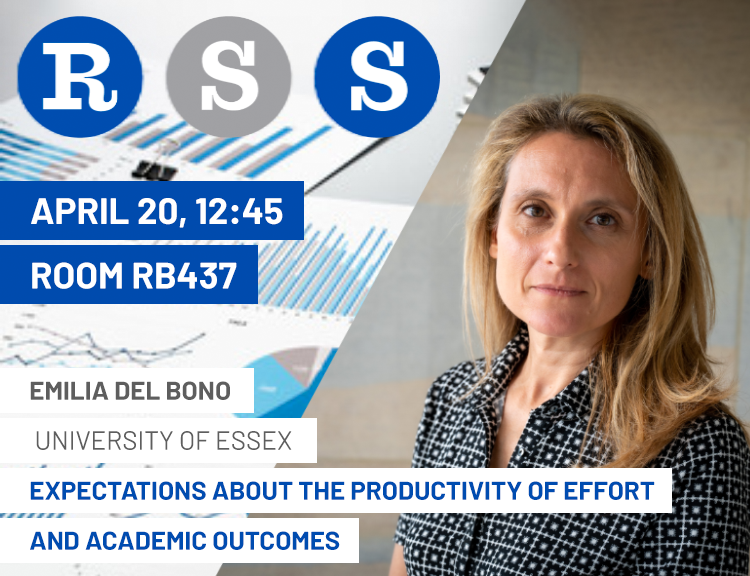Emilia Del Bono (University of Essex) 20.4.2023
V rámci Research Seminar Series in Economics máme tu čest, že nám ve čtvrtek 20.4.2023 od 12:45 do 14:15 v místnosti RB437 bude přednášet prof. Emilia Del Bono (University of Essex) o svém výzkumném projektu s názvem „Expectations about the Productivity of Effort and Academic Outcomes: Evidence from a Randomized Information“.
Add the seminar to your calendar, here. Registration is not required and anyone who would like to attend is warmly invited.
BIO: She is a Professor of Economics at ISER, University of Essex. Her research agenda is focused on the nature, causes, and consequences of disparities in children’s human capital that lead to inequalities later on in life. As of March 2020 she is the new Director of the ESRC-funded Centre for Micro Social Change (MiSoC). MiSoC is a multidisciplinary centre, promoting collaboration between economists, sociologists and other social scientists, and using quantitative social science to provide evidence with which to address key societal challenges. MiSoC has been based at ISER at the University of Essex since 1989. Our programme of work for the 2019-2024 cycle will investigate how individuals and families are responding to the challenge of the world’s need for a creative, adaptable labour force – with higher levels of education and a greater reliance on social skills. It will also explore demographic changes: including new family structures, changing gender roles, an ageing population and growing diversity from migration. She is also continuing to work on the ESRC-funded project Inequality in Higher Education Outcomes in the UK, which features a large longitudinal study of higher university students started in 2015.
ABSTRACT: Girls outperform boys in terms of educational attainment in school and spend more time and effort on schoolwork. One possible explanation is that girls have different beliefs about the productivity of effort. We evaluate a randomized information intervention targeted at individual beliefs about the productivity of effort among a cohort of first-year university students and investigate whether it can reduce gender differences in academic outcomes. We measure individual beliefs about the productivity of effort using subjective expectations about the education production function. Our intervention increases overall first-year GPA by 0.14 of a standard deviation, with a similar effect on graduation GPA. The effects are larger for men, such that the intervention significantly reduces the gender gap in academic achievement, which is 0.12 of a standard deviation in the treated group compared to 0.39 in the control group. Detailed data on inputs and beliefs allow us to shed light on the mechanisms. We document a positive treatment effect in the quantity and quality of effort exerted, as well as in beliefs about the direct effect of effort on grades.
For the upcoming seminars, see the RSSE Calendar or Program.
